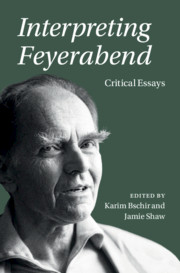Book contents
- Interpreting Feyerabend
- Interpreting Feyerabend
- Copyright page
- Contents
- Figures
- Tables
- Contributors
- Introduction
- Chapter 1 Feyerabend on Art and Science
- Chapter 2 The Coherence of Feyerabend’s Pluralist Realism
- Chapter 3 Feyerabend’s General Theory of Scientific Change
- Chapter 4 Feyerabend’s Theoretical Pluralism
- Chapter 5 Epistemological Anarchism Meets Epistemic Voluntarism
- Chapter 6 Feyerabend Never Was an Eliminative Materialist
- Chapter 7 Feyerabend’s Re-evaluation of Scientific Practice
- Chapter 8 On Feyerabend, General Relativity, and “Unreasonable” Universes
- Chapter 9 Feyerabend, Science and Scientism
- Chapter 10 Against Expertise
- Chapter 11 A Way Forward for Citizen Science
- Bibliography
- Index
Chapter 7 - Feyerabend’s Re-evaluation of Scientific Practice
Quantum Mechanics, Realism and Niels Bohr
Published online by Cambridge University Press: 26 March 2021
- Interpreting Feyerabend
- Interpreting Feyerabend
- Copyright page
- Contents
- Figures
- Tables
- Contributors
- Introduction
- Chapter 1 Feyerabend on Art and Science
- Chapter 2 The Coherence of Feyerabend’s Pluralist Realism
- Chapter 3 Feyerabend’s General Theory of Scientific Change
- Chapter 4 Feyerabend’s Theoretical Pluralism
- Chapter 5 Epistemological Anarchism Meets Epistemic Voluntarism
- Chapter 6 Feyerabend Never Was an Eliminative Materialist
- Chapter 7 Feyerabend’s Re-evaluation of Scientific Practice
- Chapter 8 On Feyerabend, General Relativity, and “Unreasonable” Universes
- Chapter 9 Feyerabend, Science and Scientism
- Chapter 10 Against Expertise
- Chapter 11 A Way Forward for Citizen Science
- Bibliography
- Index
Summary
In this chapter, I offer a specific interpretation of how Feyerabend came from a Popperian critique of the Copenhagen interpretation to a detailed re-evaluation of Niels Bohr’s idea of complementarity. Engaging with this chapter of Feyerabend’s intellectual Werdegang is not only an interesting exercise in Feyerabendian exegesis; an explanation of this change of mind in a very narrow domain – or so it seems – gives the backdrop for Feyerabend’s thoroughgoing turn from methodological monism to methodological pluralism, for which he would became known to a wider audience with his publication of Against Method (Feyerabend 1975a).1
- Type
- Chapter
- Information
- Interpreting FeyerabendCritical Essays, pp. 132 - 156Publisher: Cambridge University PressPrint publication year: 2021
- 8
- Cited by

